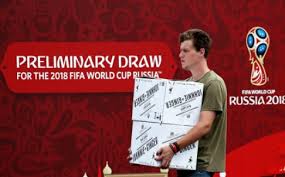By Andrew Warshaw
July 24 – As they prepare for their biggest day since being awarded the tournament, Russia’s 2018 World Cup organisers are being constantly reminded about the issue of racism that shows little sign of diminishing.
In the build-up to Saturday’s preliminary draw in St Petersburg, attended by almost every FIFA federation, a raft of celebrities and watched on television by hundreds of millions of fans across the globe, Brazilian striker Hulk, who has strongly criticised racist attitudes in Russian football, has been replaced as one of the personalities assisting with the draw.
A brief statement issued by FIFA blamed “club commitments with FC Zenit”, Hulk’s current club, for the change, with former Russia midfielder Alexey Smertin drafted in to take his place.
Zenit play in Yekaterinburg on Sunday, three hours from St Petersburg by air but it is no co-incidence that Hulk, Russian football’s record signing, said earlier this week he faced racism in “almost every game” and cast doubts on whether it could be eradicated in time for the World Cup.
“If this happens in the World Cup, it will be really gross and really ugly,” he was quoted as saying. “Usually it happens only in Russian club competition and it doesn’t come out to the world and the world doesn’t know about this. I see this happening at almost every game. I used to get angry, but now I see this doesn’t help so I just blow a kiss to our fans instead.”
Last week, Ghanaian Emmanuel Frimpong protested that he had been abused during the opening round of the new Russian league season while playing for FC Ufa against Spartak Moscow. The former Arsenal player responded with a single-finger gesture to Spartak fans, was sent off and banned for two games. Frimpong accepted the ban but described as “beyond a joke” the Russian FA’s rejection that any racism had taken place.
A report earlier this year from the anti-discrimination group FARE found more than 200 incidents of racist and discriminatory behaviour linked to Russian football over two seasons. The Russian government disputes the figures.
FIFA’s head of sustainability Federico Addiechi said the Russian Football Union had been asked to explain the reasoning behind the Frimpong sanction.
“Immediately after we knew about the case we contacted the Russian FA – that was on July 21,” he told reporters. “We’ve given them seven days to provide information about the case because we thought it was a prominent case that included possible allegations of discrimination, and because it was happening in the country which is hosting the World Cup.”
But Addiechi said FIFA was there to try assist the Russian authorities in terms of dealing with racism.
“If the Russian Football Union are in need of our support, and I think they are, then we can provide them with support.”
“It would be naive and arrogant for us to come here and say were are going to educate Russia. We are in no position to do that, we have no need to do that, we have no moral statue to do that. (But) it is up to us as the organizers of this event to make sure this event is welcoming everyone, not just for the players and participants but also for the fans.”
Frimpong’s case is the latest high-profile racism incident to hit Russian football. Manchester City’s Champions League game at CSKA Moscow last season was played behind closed doors, in part because of racist behaviour from CSKA fans.
Russia’s World Cup chief Alexei Sorokin told Sky that reports of racism among Russian fans had been “deliberately blown-up by a lot of media”.
“It is an issue…but I maintain it’s not a systemic challenge for society. There are more than 100 nationalities in our society that peacefully co-exist,” he said.
Yury Boychenko, who heads the Anti-Discrimination Section at the United Nations Human Rights Office of the High Commissioner, told a press conference in St Petersburg it was partly to do with cultural differences but said that was no excuse.
“In Russia we have noticed that there is not a clear understanding of what racism means,” he said. “It is not a simple question of black and white. It is about ethnicity and language, religious affiliation, culture, and so forth. I believe the recognition is coming. It’s a behavioural problem and a societal problem. The first thing is recognition there is a problem, and recognition is coming. But the authorities and officials in sport bear responsibility for what happens on the field.”
Contact the writer of this story at moc.l1738990728labto1738990728ofdlr1738990728owedi1738990728sni@w1738990728ahsra1738990728w.wer1738990728dna1738990728

